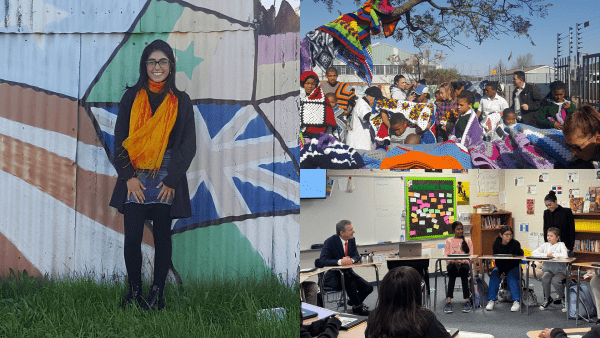Natalia Mejia ’20 learned lessons abroad to empower her community

Stories have the power to open hearts and minds. That’s why Natalia Mejia ’20 put pen to paper to tell the story of her study abroad trip to South Africa for the Marian Beane Crossing Borders Writing Contest. While abroad, she was confronted with cultural inequities, the preciousness of education and the power of community — factors that still influence her.
Mejia, who earned a Bachelor of Art in Elementary Education (K-6) from UNC Charlotte, is set to complete the Latin American Studies master’s program this spring. She balances a pursuit of post-graduate education with teaching English as a second language to sixth, seventh and eighth graders at C.C. Griffin STEM Middle School in Cabarrus County.
Inspired to be the representation she didn’t see growing up in North Carolina schools, Mejia is an accomplished young teacher in the region. She was named the North Carolina Beginning Teacher of the Year and serves as an Ambassador of Learning Happens Here within the North Carolina Department of Cultural and Natural Resources. These designations have enabled Mejia the opportunity to travel statewide, meeting fellow educators and spreading the word about North Carolina public schools.
“Right now public schools are not viewed as the center of a community,” Mejia said. “I knew what I wanted to work toward spreading the word about the amazing things that happen in North Carolina public schools every day.”
Before becoming a teacher, she was an aspiring educator with a dream to study abroad. A proud Latina, Mejia forwent her quinceanera in order to save money for a study abroad program. She chose South Africa after being inspired by Erik Byker, a professor in the Cato College of Education Department of Reading and Elementary Education, who was leading the trip.
During her trip to South Africa in 2018, Mejia was confronted with heavy topics as she explored the nation through the lens of education. She saw firsthand how race and language shaped the culture of the area. She also saw young students without pencils, tools and other materials necessary for success.
“It’s intense,” Mejia said. “When you see those transitions of power and privilege. Those things changed me as an educator, and I really started to make connections between those experiences and the experiences of myself, my peers and children in the United States.”
A pivotal moment of her trip came when the class celebrated Nelson Mandela Day by partnering with the nonprofit organization 67 Blankets for Nelson Mandela Day. An elderly woman who knits blankets for the organization picked Mejia out of the group of students and “adopted” her for the day. Mejia said she connected with the woman because she reminded her of her grandmother who crochets.
When the class returned home, Mejia and Byker continued to collect yarn to send back to South Africa for the woman and the organization. By the time Mejia returned in 2019, the woman had passed away. The fact that a stranger was able to connect to her in that way inspires her to this day.
“She gave me her time, which is so precious,” Mejia said. “She listened, and she just saw community in me.”
The Zulu word “ubuntu” translates to “I am because we are.” This philosophy reinforces the power of community. Six years after traveling to South Africa, Mejia still carries the lessons learned as an educator in Cabarrus County.
“I came back home and thought, I am who I am because of my community and schools are foundational to that,” Mejia said. “Schools are foundational to building communities. You invest in public schools, you invest in your community.”
Mejia started the annual Hispanic Heritage Festival at C.C. Griffin where she connects the Hispanic community and local partners while empowering kids to lead their own performances. She also connected her school community with the African American mentoring organization 100 Black Men of Charlotte.
Last year, Mejia won the Marian Beane Crossing Borders Writing Competition for the graduate category. She recommends students use the opportunity to tell their stories.
“Once you open someone’s heart, you open up their mind,” Mejia said. “So telling a story is the most powerful way to just reel someone in.”